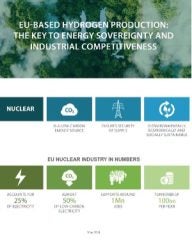
European nuclear trade organisation nucleareurope has issued a position paper outlining how EU-based hydrogen production can support energy sovereignty and industrial competitiveness.
“Domestic production of hydrogen can help solve some of the challenges which the EU is facing in terms of energy security, environmental sustainability, and economic competitiveness” said nucleareurope Director General Yves Desbazeille. “Reimagining how hydrogen, a versatile and clean energy carrier, can play an important leading role in transforming the energy system is key in this respect.”
The paper notes that currently the European Commission’s focus is “primarily on hydrogen produced exclusively from renewables, with a significant share of this hydrogen being imported from third countries, notably from the global south” However, this will increase energy demand “due to transportation and losses while potentially exploiting countries where energy poverty is high and affecting Europe’s energy sovereignty by creating a dependency on imported renewable hydrogen”.
Nucleareurope says other low-carbon energy sources, such as nuclear, could fill the gap and help meet the original ambition of achieving net-zero by 2050. The main advantage of hydrogen production from nuclear is that the load factor of the installed electrolysers will be maximised with baseload production. One NPP with a capacity of 1000 MWe and a capacity factor of over 90%, coupled with 1000 MW of electrolysers, could produce about 0.16m tonnes of low-carbon hydrogen a year, providing an uninterrupted supply to end-users, the paper notes. Output could increase further by up to 20% if coupled with high-temperature electrolysers capable of using nuclear steam.
The paper recommends that the EU should focus on:
- Encouraging a diversified approach to hydrogen production that recognises the potential of all net-zero technologies, including nuclear energy, to enhance energy security.
- Emphasising the importance of energy sovereignty in the context of hydrogen production. EU policies should aim to reduce dependence on imported hydrogen from third countries, thereby ensuring that European member states maintain control over their energy future.
- Developing policies to support the growth of domestic hydrogen industries, recognising their role in reindustrialisation and job creation. Such policies should consider financial incentives, regulatory frameworks, and collaborative initiatives to ensure the competitiveness and sustainability of domestic hydrogen production facilities.
- Advocating for strategic investments in infrastructure that support domestic hydrogen production, storage, and distribution. The EU should consider developing a comprehensive hydrogen infrastructure plan that prioritises proximity to end-users, cost-effectiveness, and environmental sustainability.
- Allocating resources for research and development initiatives focused on improving the efficiency and cost-effectiveness of hydrogen production technologies, including nuclear-based methods. The EU should foster collaboration between industry, research institutions and governments to accelerate innovation in the hydrogen sector.






